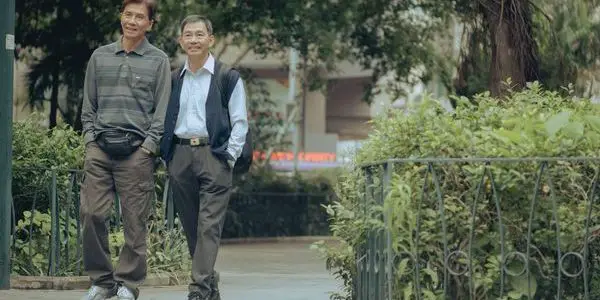To label Ray Yeung’s Suk Suk as an unconventional love story would not be completely inaccurate, but it would certainly undermine the complexities of this cinematic gem. Set on the backdrop of two ageing men who develop a romantic relationship with each other during their twilight years, the film serves as a detailed examination of both social and emotional dissonance in a population that we don’t often think about. Yeung has crafted a socially conscious and important piece of filmmaking, which may surprise international audiences who are more accustomed to Hong Kong cinema’s kinetically charged genre films.
The film follows Pak (Tai Bo), an ageing taxi driver and traditional family man. He ends up meeting Hoi (Ben Yuen), who like him, marks his existence with a strong commitment to his familial responsibilities. As the two become romantically involved, they are forced to confront how their existence as lovers might collide with the lives that society has always shaped for them. Patra Au – a veteran stage performer who makes a seamless transition to the silver screen – impresses as Pak’s dedicated wife, while Lo Chun Yip brings a sense of honest brevity as Hoi’s son.
When subtlety becomes a natural sensibility
Right from the outset, it’s clear that Yeung has no intention of creating a film that bellies over on melodrama. Despite delving into a story that clearly has the working ingredients of a melodramatic narrative, Suk Suk chooses to internalize these instincts. Instead of sparring matches between family members or overly tearful pronouncements, the characters simply live through their emotions. The film is void of any outbursts, but the emotional transformations of each character – particularly that of the two leads – are still very clearly felt.

In many ways, Yeung’s decision to rely on subtlety, rather than dramatics, creates a much more natural form of narration. Similar to everyday life, we don’t always wear our hearts on our sleeves, but that doesn’t necessarily make our experiences any less dramatic. Yeung essentially uses subtlety to subvert the sense of realism we often see in dramatic filmmaking, and instead, creates a much more natural sensibility. This makes it easier to form a relatable emotional connection with the film itself, which only heightens the turmoil experienced by the film’s characters.
Examining the performances with a cultural lens
The subtle nature of Suk Suk can also be traced back to the quiet performances from the film’s many talented thespians. Every glance, gesture and exchange of dialogue feels restrained, but speaks volumes by channelling an abundance of pent up emotion. While all this can be read as part of Yeung’s reserved stylistic approach and minimalistic screenplay, there’s likely also an important cultural context in these performances; one that truly illustrates how reticent the older Asian generation tends to be when it comes to expressing their feelings. There’s a tendency to rely on unspoken words, and that’s exactly how audiences experience emotion in this film.
As an example, rather than relying on expository dialogue during instances of brewing conflict, the film often asks audiences to read between the lines. We see this during conversations at the dinner table between the two primary families, or even during the romantic interactions between Pak and Hoi. Both Tai and Yuen’s ability to externalize their subdued emotion is quite remarkable, and this level of restraint also speaks to the isolation experienced by older gay men in society. Themes of isolation and regret are paramount to Suk Suk’s overall messaging, which is only bolstered by the film’s performances.
To further understand this, it’s also worth noting that the film’s title in Cantonese actually translates to ‘uncle’, which is used as a term of endearment when referring to older men in Chinese society. This context of endearment also filters into how we view the budding relationship between Pak and Hoi, in addition to how they interact with their own families. Tai and Yuen don’t behave as lovers in the traditional cinematic sense, but as two people who we would consider to be a ‘suk suk’, they are behaving just as they should.
Final thoughts
As Hong Kong cinema continues to evolve and deviate from its strong commercial roots, a film like Suk Suk is both important and necessary in reshaping the industry’s overall identity. Yeung has crafted a film that relishes on its local roots, but also has a strong universal thematic presence that easily reaches out to any viewer hoping to experience an emotional narrative.
Many have been quick to compare Suk Suk to previous Hong Kong cinematic endeavours about the LGBTQ community, most notably to Stanley Kwan‘s Lan Yu or Wong Kar-Wai‘s Happy Together. While these comparisons are both fair and flattering, it’s clear that Yeung is paving his own path with a voice that is distinctively his own. It’s a godsend that a film like this has received such a strong film festival run, as Yeung is truly deserving of international recognition as an emerging Hong Kong filmmaker.
Watch Suk Suk
Does content like this matter to you?
Become a Member and support film journalism. Unlock access to all of Film Inquiry`s great articles. Join a community of like-minded readers who are passionate about cinema - get access to our private members Network, give back to independent filmmakers, and more.